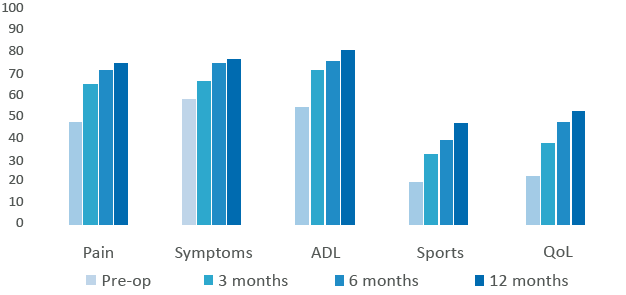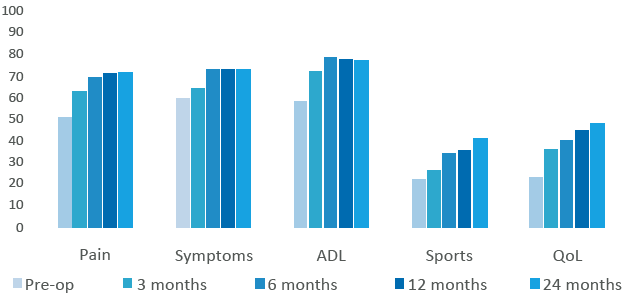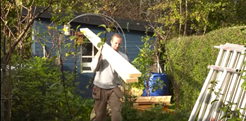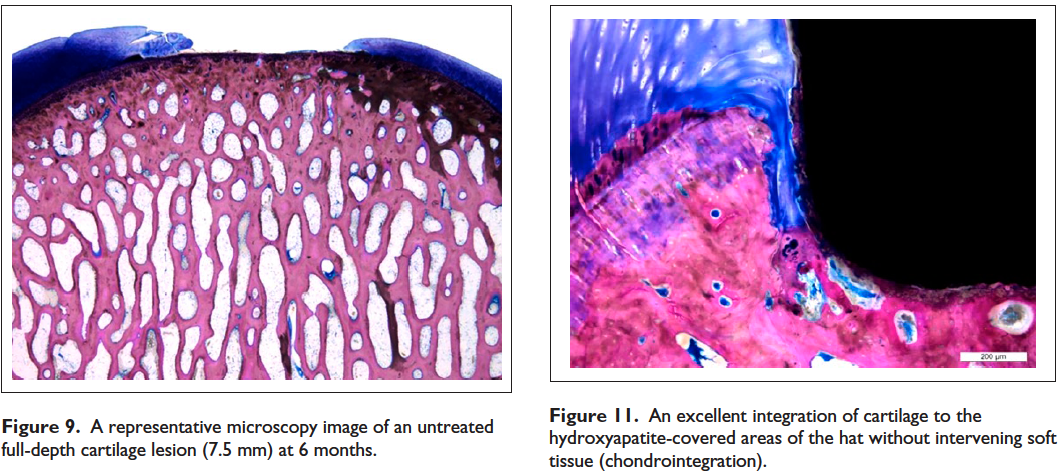|
|
|
We would like to take this opportunity to wish you a happy festive season and all our best wishes for 2018!
This is the first Episurf Medical quarterly newsletter. We are constantly engaging in various dialogues and activities with all of our stakeholders. This first edition focuses on the latest publications and clinical results. Our ambition is to continuously briefly summarise the development during the last quarter. We sincerely hope that you find this format appealing and that we can keep you up-to-date with our latest development.
Pål Ryfors, CEO, Episurf Medical
|
|
|
The study behind the publication is a multi-center clinical study conducted in Sweden with Dr Anders Stålman as principal investigator. The surgeries were performed between 2012 and 2014. The patients were followed-up with subjective outcome measures (VAS, Tegner, EQ5D and KOOS) and implant fixation was studied with RSA. The subjective outcome measures showed improvements that reached significance for VAS (p≤0,001), Tegner (p=0,034) and the KOOS sub-scores Activities of Daily Living (p=0,0048), Sport and Recreation (p=0,034) and Quality of Life (p=0,037).
“This first publication from a clinical multi-center study with Episealer®, a customized focal knee resurfacing system, shows short-term implant safety and the patient related outcome measures show good to excellent results” says Anders Stålman, PhD, Senior Consultant, Capio Artro Clinic, Stockholm. |
|
|
|
|
| | |
70 patients at 12 months' follow-up. Average age at surgery: 48 years (range 30-72).
|
30 patients at 24 months' follow-up. Average age at surgery: 46 years (range 30-67). |
 | |
70 patients at 12 months' follow-up. Average age at surgery: 48 years (range 30-72).
|  |
30 patients at 24 months' follow-up. Average age at surgery: 46 years (range 30-67). |
|
It is very satisfactory to be able to present this data regarding patient well-being. At 1 year, in the cohort of 70 cases that have reached 12 months, we could show clinically and statistically significant improvement. At 24 months, a cohort of 30 cases showed no deterioration of the scores these cases had at 12 months. Comparing the 12-month data for these 2 cohorts, the later cohort that has only reached 12 months’ show even better results than the earlier cohort. I find that this data is also confirmed in the peer-reviewed publication by Stålman et Al. which you can read about above. I’m proud when I see how the Episealer helps patients and later in this newsletter you will also find a case review with a carpenter who was the first patient in Denmark who received an Episealer implant. |
|
Priv.-Doz. Dr. med. C. Kösters presented his experience of Episealer at the 34th AGA congress which this year took place in Munich on 7-9 September.
“Even though this is a short time follow-up, this seem to be a very good treatment for patients with cartilage defects. We find that many biological treatments tend to fail and this is a good alternative to offer to those patients.” |
|
|
The first Episealer Masterclass was held on 2-3 November. Forty international surgeons met for education, discussions and hands-on practice in Stockholm, Sweden.
“This is the first meeting we arrange and we appreciate the feedback we received from the attendees. Education is highly prioritised in our company and we will continue with local as well as international meetings where existing and coming users have a chance to discuss and share their experiences” says Tom Vreys, Product Manager at Episurf Medical.
|
|
|
|
| |
Laursen, J.O., 3-Year Clinical Result of a Customized Metal Mini-Prosthesis for Focal Chondral Lesion in The Knee Of A Formerly Active 31-Year-Old Man. Journal of Exercise, Sports & Orthopedics, 2017. 4(2): p. 1-3.
31 year-old former fulltime carpenter, very active football- and handball-player. Knee injury in 2011 in handball with ACL – lesion and cartilage lesion on medial femur-condyle. Arthroscopic ACL-reconstruction and micro-fracturing of the 2 cm2, ICRS grade-3 cartilage lesion on the medial condyle. No effect on the medial knee-pain, and new arthroscopy 6 months later revealed a then grade-4 cartilage lesion. A new micro-fracturing procedure was carried out, but without effect. He had daily pain (VAS 7-8) in the knee – taking painkillers, paracetamol and NSAID regularly, and had been unable to work for almost 2 years. Two years after the index injury, he was operated with this new resurfacing mini-prosthesis (Episealer).
Read the case full case report here.
Watch the patient's own story here.
|
Martinez-Carranza, N., et al., Cartilage Health in Knees Treated with Metal Resurfacing Implants or Untreated Focal Cartilage Lesions: A Preclinical Study in Sheep. Cartilage, 2017.
Full-depth cartilage lesions do not heal and the long-term clinical outcome is uncertain. In the symptomatic middle-aged (35-60 years) patient, treatment with metal implants has been proposed. However, the cartilage health surrounding these implants has not been thoroughly studied. Our objective was to evaluate the health of cartilage opposing and adjacent to metal resurfacing implants.
Read the full article here.
|
 |
Laursen, J.O., 3-Year Clinical Result of a Customized Metal Mini-Prosthesis for Focal Chondral Lesion in The Knee Of A Formerly Active 31-Year-Old Man. Journal of Exercise, Sports & Orthopedics, 2017. 4(2): p. 1-3.
31 year-old former fulltime carpenter, very active football- and handball-player. Knee injury in 2011 in handball with ACL – lesion and cartilage lesion on medial femur-condyle. Arthroscopic ACL-reconstruction and micro-fracturing of the 2 cm2, ICRS grade-3 cartilage lesion on the medial condyle. No effect on the medial knee-pain, and new arthroscopy 6 months later revealed a then grade-4 cartilage lesion. A new micro-fracturing procedure was carried out, but without effect. He had daily pain (VAS 7-8) in the knee – taking painkillers, paracetamol and NSAID regularly, and had been unable to work for almost 2 years. Two years after the index injury, he was operated with this new resurfacing mini-prosthesis (Episealer).
Read the case full case report here.
Watch the patient's own story here.
|  |
Martinez-Carranza, N., et al., Cartilage Health in Knees Treated with Metal Resurfacing Implants or Untreated Focal Cartilage Lesions: A Preclinical Study in Sheep. Cartilage, 2017.
Full-depth cartilage lesions do not heal and the long-term clinical outcome is uncertain. In the symptomatic middle-aged (35-60 years) patient, treatment with metal implants has been proposed. However, the cartilage health surrounding these implants has not been thoroughly studied. Our objective was to evaluate the health of cartilage opposing and adjacent to metal resurfacing implants.
Read the full article here.
|
|
|
|